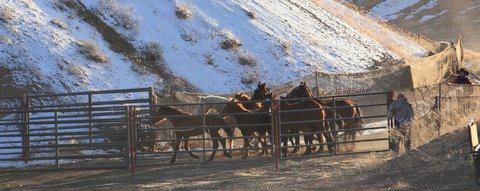
The U.S. Bureau of Land Management is issuing new policy directives emphasizing “compassion and concern” for wild horses on federal lands in the West, in response to a growing public outcry over alleged abuse during roundups of thousands of mustangs in recent years.
Federal laws protecting wild horses since the 1970s require the government to treat them humanely when culling overpopulated herds to reduce harm to public rangeland.
But BLM officials said a series of new internal policy directives announced Friday will better protect free-roaming horses and burros by centralizing oversight and stepping up daily reports at each individual gather across 12 Western states.
“Press/media, congressional and public attention to recent gathers have compelled the BLM to provide the most accurate and up-to-date information,” one of the new directives states.
The announcement drew, at best, a chilly response from most in the horse protection community skeptical of the agency’s intentions and a harsh rebuke from the largest national coalitions, which called it a “step backward.”
“It’s an attempt by BLM to address criticism, but will do nothing to change the practices on the ground at the roundups,” said Deniz Bolbo, spokeswoman for the American Wild Horse Preservation Campaign made up of more than 50 groups.
Among other things, helicopter contractors will have to take extra care not to separate slower young animals from their mothers during roundup stampedes.
The new orders also require the agency to make sure the public has reasonable access to observe the roundups, in compliance with federal law. The 9th Circuit Court of Appeals in San Francisco recently granted a horse advocacy group’s appeal and ordered the BLM to review its practices to ensure it didn’t violate the First Amendment by keeping some critics away from a 2012 gather in Nevada.
“At all times, the care and treatment provided by the BLM and contractors will be characterized by compassion and concern for the animal’s well-being and welfare needs,” wrote Edwin Roberson, assistant director of the BLM for Renewable Resources and Planning.
Acting BLM Director Mike Pool said the changes represent “significant and substantial improvements” aimed at ensuring the “humane treatment of animals that are gathered on public rangelands.”
“At the end of the day, we need to find better ways to manage for healthier animals and healthier rangelands so that we can keep these symbols of the American West on our nation’s public lands,” he said.”
BLM spokeswoman Michelle Barret told The Associated Press, “All of this is in response to public concerns that were raised in a number of gathers. … The welfare issues, the humane animal treatment during gathers, we realized that we needed to step it up here and address some of the public concerns.”
Laura Leigh, president of the Nevada-based Wild Horse Education, who appealed her case to the 9th Circuit, is glad BLM is addressing the roundup concerns but doesn’t “hold much hope that I will witness much change.”
“I’ll believe it when I see it,” added Anne Novak, executive director of Protect Mustangs in Berkeley, Calif.
American Wild Horse Preservation Campaign founder Neda DeMayo criticized part of the new policy that specifies BLM treat horses “consistent with domestic livestock handling practices.” That’s a significant step back from the standard BLM Nevada Director Amy Lueders established in a December 2011 memo that said it should be consistent with “domestic horse handling procedures,” she said.
“Although domestic horse handling practices are a step above the livestock industry, wild horses are neither domestic horses nor livestock. They are wild animals and as such must be humanely managed as a wildlife species on the range where they belong,” DeMayo said.
About half of the estimated 37,000 horses and burros on federal lands are in Nevada. BLM maintains that the range can sustain only about 26,000 and conducts roundups regularly to try to get closer to that number. But the practice is almost always contentious.
Interior Secretary Ken Salazar, who is stepping down in March, has called wild horse management “the most difficult issue we have dealt with” in his four-year tenure.
“We’ve had hundreds of meetings on it and there are still a lot of problems,” Salazar told The Gazette of Colorado Springs last fall. He made the comment after apologizing for threatening to punch a Gazette reporter who asked him about problems with the wild horses at a campaign event for President Barack Obama.
———
Daly reported from Washington D.C.
Cross-posted from: http://abcnews.go.com/US/wireStory/blm-policy-focus-compassion-wild-horses-18375898

